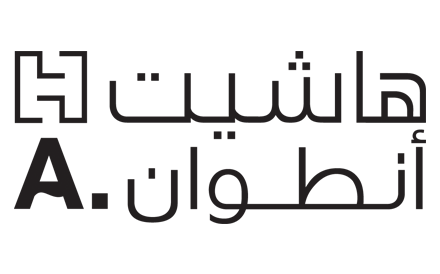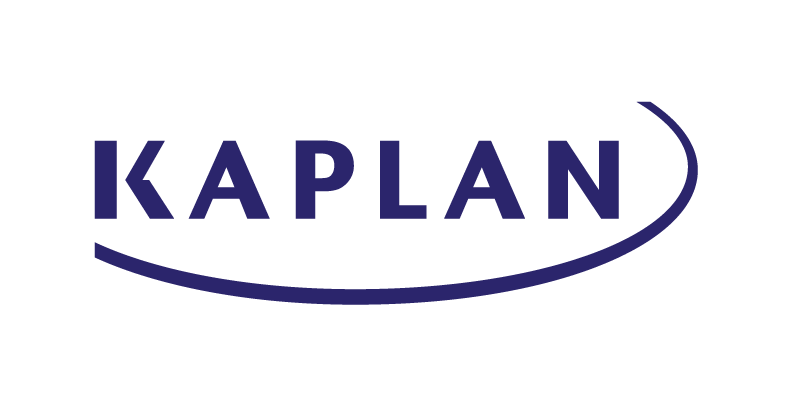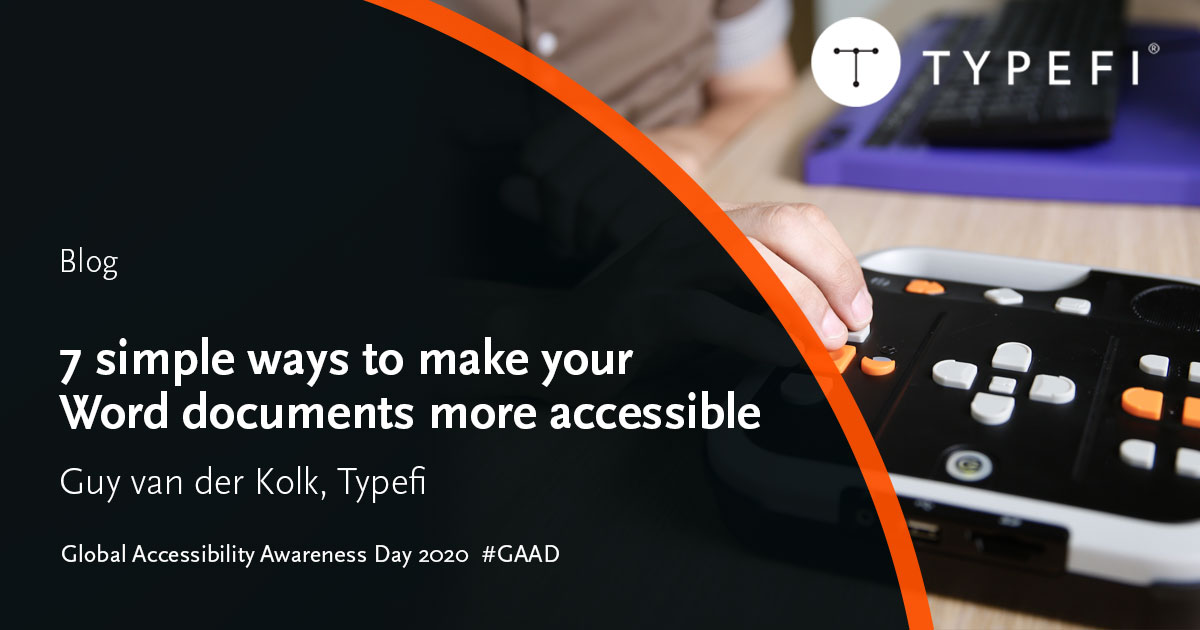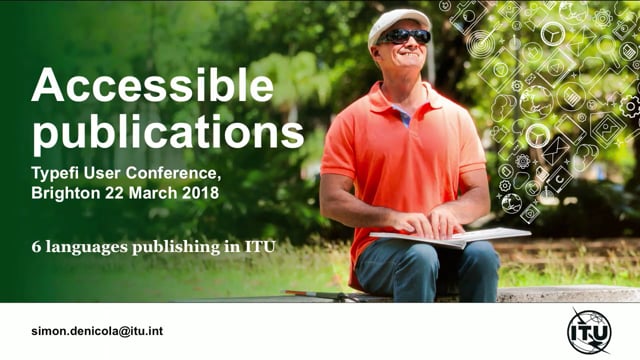Accessible Publishing Automation
Typefi publishing software can automatically compose documents in a wide range of accessible formats using the same source content you use to publish standard outputs.
Typefi has helped numerous organisations produce accessible publications with minimal additional cost and effort. In fact, the World Report on Disability, published jointly by the World Health Organization and the World Bank, was composed and produced in accessible formats with Typefi.


New EAA accessibility requirements
The European Accessibility Act goes into effect on 28 June 2025. This directive lays out new accessibility requirements for digital content including e-books—and Typefi makes it easier to achieve compliance.
Under the EAA, all e-book files must have proper semantic tagging and any images must have descriptions. In Microsoft Word, that means you must use paragraph and character styles along with proper heading hierarchy while avoiding direct formatting and empty white space.
Typefi can help you meet these new accessibility rules. Contact our accessible publishing experts to learn how you can update your content and publish accessible titles incredibly quickly using automated publishing software.
Accessible Publishing Automation Can Help
It’s really a life-changing tool, and it saves you a lot of stress.

The Fastest Accessible Publishing Engine
Typefi enables you to produce up to 1000 pages of accessible content per hour—automatically! The software natively supports:
- Content structuring for headings, tables, and bulleted/numbered lists
- Alternate text for images, charts and graphs
- Language tagging
- Navigational tables of contents and bookmarks in digital outputs
- PDF, HTML5, xHTML, EPUB and DAISY output formats
- Simultaneous creation of multiple output formats from a single source
- PDF metadata modifications for accessibility
Accessible Publishing Automation Can Help
Our production time reduced from 1 month to 3 days. As well as much faster production turn-around, automating composition has resulted in a noticeable reduction in errors. That’s really important for us.

Support for Common Accessible Formats
Typefi can automatically create 30+ common outputs including accessible formats like DAISY, EPUB, HTML, and XML, and help you prepare files for PDF/UA compliance. You can easily produce different versions of the same document (e.g. a larger font version) and use conditions to include/exclude content for different output formats. You can event publish in multiple languages with minimal extra effort!
Accessible Publishing Automation Can Help
Typefi software allows us to quickly transform our content into our desired deliverables, whether it be a print product, a PDF, and on occasion, EPUBs.

Faster Compliance with Accessibility Standards
Typefi makes it easier to meet the requirements of accessibility legislation in your region including the European Accessibility Act, European Disability Act, the Disability Discrimination Act (UK and Australia), and Section 508 of the Rehabilitation Act (US). Typefi can also help you produce content that meets accessibility standards such as the Web Content Accessibility Guidelines (WCAG) 2.2 level AA and ISO 14289-1:2014 PDF/UA (Universal Accessibility).
Accessible Publishing Automation Can Help
When you tag your text in Word and apply all the styles, Typefi can process this into a well-designed book in InDesign. You literally just press Print and Typefi does the work for you.
Here's How We Can Help
Accessible Publishing Automation
Typefi is the fastest automated publishing engine based on Adobe InDesign, and it’s optimised for accessibility. Publish in multiple accessible formats without tedious additional work, reduce costs, and streamline your production workflow with Typefi automated publishing software.
Do more accessibility. Do more with Typefi.
Typefi has delivered the benefits we hoped for—improved accuracy and faster production times.
Accessibility Resources
How to publish accessible content automatically
- Categories: Accessibility, EPUB, HTML, PDF
In this webinar, Typefi Product Manager and accessibility expert Guy van der Kolk demonstrates how Typefi can publish accessible content automatically in common formats like PDF, EPUB, and HTML. He dissects the InDesign template and Word source document, then explains Typefi workflows and shows how Typefi can publish accessible formats automatically. If you need to produce lots of accessible publications then this is for you!
How to comply with the EAA
- Categories: Accessibility, EPUB, PDF
In this webinar, digital accessibility expert Will Awad discusses what the European Accessibility Act requires and explains how you can make sure your organisation is in compliance. It's a jam-packed webinar with tons of valuable information including specific requirements of the EAA, enforcement differences across countries, tips for writing alt text, and workflow advice for updating frontlist and backlist titles.
Accessibility basics & best practices
- Categories: Accessibility, InDesign, PDF
In this webinar, accessibility expert Chad Chelius teaches the basics of accessibility and shows how to achieve it with InDesign and PDF files. Chad covers the fundamentals of accessibility, how to achieve accessibility using InDesign, what you need to make PDF files accessible, and much more. This is the perfect primer for anyone new to accessibility, but there’s plenty for accessibility pros too.
7 simple ways to make your Word documents more accessible
- Category: Accessibility
Microsoft Word is one of the most popular word processing tools available, and it has the power to create pretty decent accessible documents—if you know the tricks. Learn how to improve accessibility in your Word documents in this article.
How to write better alt-text for images
- Category: Accessibility
Alternative text, or alt-text, is a short description of an image that explains the content of an image to a user or a search engine. Learn how to write better alt-text in this article by Huw Alexander from textBOX.
Case study: International Telecommunication Union
- Categories: Accessibility, Case Study, Multilingual Publishing
In this presentation from the 2018 Typefi User Conference, Simon De Nicola, Head of the Publication Production Department at ITU, shares how Typefi helped the organisation implement accessible publishing. The ITU now produces accessible publications in six languages using Typefi.






